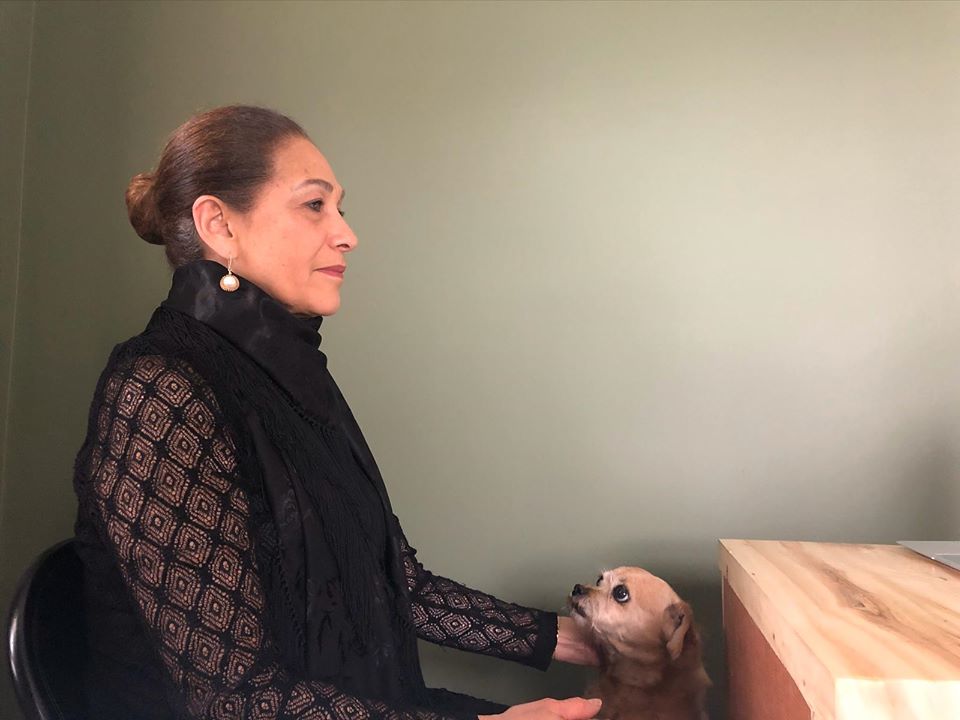
Teatro Quarantine: Striving for “duende” through a computer screen
After the opening night of her play was canceled by coronavirus, Tanaquil Márquez has found a virtual outlet for her creativity.
Tanaquil Márquez says she will never premier a show on Friday the 13th ever again.
March 13, 2020 was a Friday and the opening night for Márquez and Teatro del Sol’s play Oedipus El Rey, a modern Chicano take on Sophocles’ Greek tragedy, at the Arden Theatre.
At least, that was the plan until the coronavirus pandemic canceled everything.
“That was the biggest pang to the heart,” said Márquez.
But the “soul-crushing” reality, as she called it, served as a catalyst for a new creation suited for the new normal of quarantine.
Just two weeks after Oedipus El Rey was canceled, Márquez founded Teatro Quarantine, a new, virtual theater project that is releasing episodes on Facebook based around scenes in Federico García Lorca’s classic, Bodas de Sangre (Blood Wedding).
As of June 1, the project has released three of a planned eight episodes in the series. The cast is entirely Latinx and mostly based in the Philadelphia-area, with one actor also in New York and another in London.
When picking Bodas de Sangre as the play to base Teatro Quarantine around, Márquez was both going back to her roots and offering a view into the world of an artist amid COVID-19 and quarantine.
“This is the fourth time I’ve done this show,” she said. “It’s my favorite play.”
Her reasons for favoring it include the use of language, the storyline, which critiques the gender roles of Lorca’s time through tragedy, and his famous theme of “duende.
“Duende,” Márquez said, can be loosely translated to “passion” in English, “but it goes beyond passion as we know it.”
“It is the feeling storytelling creates when it’s most heightened in an emotional state,” she said. “When art transcends what is physically in the room with us to reveal some truth.”
For an artist to achieve “duende,” they must go through a struggle. The truth about Márquez and so many other artists in Philadelphia and around the country and world is that they’re living that struggle right now.
“We’re all struggling to somehow create art,” she said.
Márquez’s struggle is coming to grips with the fact that Teatro Quarantine, despite its title and virtual platform, is not theater in her eyes.
“It’s not even close,” she said.
In her eyes, theater is made with the shared experience between performers and their audience.
“It’s almost like electricity when you put something on stage and you are in this room with everyone watching,” said Márquez.
It’s an experience that engages all the senses, and one that is sacrificed on a virtual platform.
Márquez called the adjustment one of the most challenging of her career, equating the shift to virtual as “a science.”
The presentation format drew inspiration from an obscure, 1967 tourism ad for Ontario, Canada. Individual angles from the same scene are shown in frames of varying size against a black backdrop.
It means every participating actor shoots their own scenes. Beforehand, they meet through Zoom to do script reads, analyze the text and organize each others’ backgrounds and angles to fit each scene.
Next, they make sure the necessary technology is in order and shoot the scene live.
In Márquez’s experience, this is where a host of issues can arise, including a weak Internet connection, running out of storage on a recording device, or an unexpected interruption from a dog or child.
“It’s just completely adjusting what you know to release this character into the story, and you have to think of so many other things,” she said, viewing the issues as another unexpected mix of science and the arts.
RELATED CONTENT
After shooting, the footage from each actor is sent to an editor to put together before publishing on Facebook.
She said the whole process takes about a week.
Despite the issues and the project’s separation from theater, she said the episodes have reached a global audience she never thought possible.
Márquez shared the experience of one of the actors in the series, who sent an episode to their father in Venezuela. Bodas de Sangre held a special place in his heart.
“I did this play in college, and that’s how I met your mother,” the father said.
“In that weird way, they connected with this play online because he wouldn’t have been able to come see it if we actually performed it live,” said Márquez. “They connected deeply through this experience.”
Hearing stories like the father’s give Márquez a better sense of what Teatro Quarantine means in times like these. To this point, she admitted she’s still processing whether the work is worth it.
“I don’t think you know that until maybe the end, or through that process,” she said. “It’s a complete discovery.”
For Teatro Quarantine, that discovery has always been about achieving “duende” in the context of separation.
“Just like our theme with our project is to search for ‘duende,’ we’re also searching to experience art together while we’re apart,” said Márquez.
Initially, Márquez was eager to push episodes out as quickly as she could, but has learned to take more time as the project has gone on.
As for funding, Teatro Quarantine operates on a $0 budget, but Márquez is accepting donations to both her Venmo and Paypal accounts for the project. More information can be found on Teatro Quarantine’s Facebook page, where the episodes also premiere.
The fourth episode is due out soon. Check out episode one below:











LEAVE A COMMENT:
Join the discussion! Leave a comment.